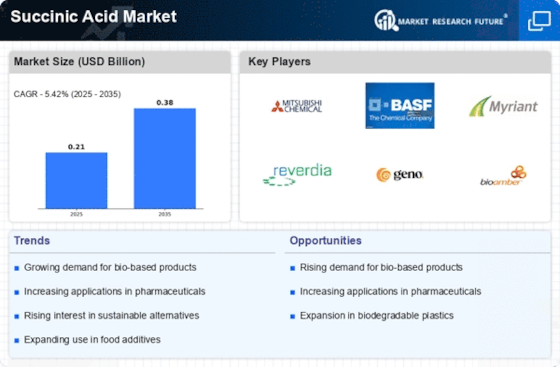Top Industry Leaders in the Succinic Acid Market

Succinic Acid Market
Succinic acid, a versatile organic acid with a vast array of applications, is witnessing a transformative journey. Its market is attracting intense competition from established players and innovative newcomers. This report delves into the intricate dynamics of this evolving landscape, exploring key strategies, market share determinants, industry news, and recent developments.
Strategies Shaping the Market:
-
Bio-based vs. Petro-based Battleground: The market is divided between bio-based and petro-based succinic acid. While petro-based currently dominates due to its cost-effectiveness, the bio-based segment is gaining traction driven by environmental concerns and sustainability initiatives. Companies like Reverdia and Myriant are leading the charge in bio-based production, employing technologies like fermentation and electrocatalysis. -
Diversification and Downstream Integration: Players are actively expanding their product portfolios by venturing into downstream derivatives like 1,4-butanediol (BDO) and polybutylene succinate (PBS). This vertical integration allows for greater control over the value chain and reduces dependence on fluctuating raw material prices. Corbion, for instance, acquired an Italian BDO producer to strengthen its downstream presence. -
Strategic Collaborations and Partnerships: Recognizing the complexity and capital intensity of bio-succinic acid production, companies are forging partnerships with research institutions, technology providers, and even competitors. These collaborations accelerate innovation, share risks, and facilitate market access. BASF and Avantium collaborated to develop a novel fermentation technology for bio-succinic acid production. -
Regional Focus and Expansion: The Asia Pacific region is expected to be the fastest-growing market due to its booming industrial base and increasing disposable income. Companies like PTTGC and Mitsubishi Chemical are actively investing in production facilities in the region to capitalize on this growth potential.
Factors Defining Market Share:
-
Production Cost and Efficiency: With cost remaining a key driver, companies are constantly optimizing their production processes to achieve economies of scale and improve efficiency. Technological advancements in bio-based production, such as the use of engineered microbes, hold the promise of cost competitiveness with petro-based methods. -
Product Quality and Consistency: Maintaining consistent product quality is crucial in industries like pharmaceuticals and food, where stringent regulations are in place. Companies are implementing stringent quality control measures and investing in advanced analytical tools to ensure product reliability. -
Brand Recognition and Reputation: Established players like BASF and Mitsubishi Chemical leverage their strong brand recognition and established distribution networks to gain an edge. However, smaller companies are carving a niche by focusing on specific applications or offering customized solutions. -
Sustainability Credentials: The growing demand for sustainable products is pushing companies to adopt eco-friendly practices throughout their production chains. Certifications like ISCC and biobased content labeling are becoming increasingly important for differentiation and market access.
Key Companies in the Succinic Acid market includes
-
Merck KGaA
-
Ernesto Ventos. S.A.
-
ThyssenKrupp AG
-
BioAmber, Inc
-
Myriant Corporation
-
Succinity GmbH
-
Technip Energies
-
NIPPON SHOKUBAI CO., LTD.
-
KAWASAKI KASEI CHEMICALS
-
Anhui Sunsing Chemicals Co., Ltd.
-
Gadiv Petrochemical Industries Ltd.
-
Spectrum Chemical Manufacturing Corp.
-
FUSO CHEMICAL CO., LTD.
-
S.S. Pharmachem
-
R-Biopharm AG among others
Recent Developments:
December 2023: Reverdia and Mitsubishi Chemical Corporation signed a Memorandum of Understanding to explore collaboration on bio-succinic acid production and commercialization in Japan.
October 2023: The European Bioplastics Association (EUBP) released a report highlighting the potential of bio-succinic acid to replace fossil-based plastics in various applications.
August 2023: A new study published in Nature Sustainability concluded that bio-succinic acid production has a significantly lower environmental impact compared to petro-based production.










